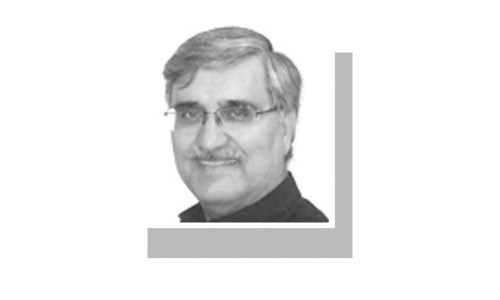THERE have been rapid developments in the past couple of weeks. First came the new IMF stand-by programme, after months of back and forth. And then just as rapidly, came the announcement from the prime minister that he and his government will be going home by mid-August.
On cue, the rest of the government and the allied parties also began speaking about the importance of holding elections on time. From senior ministers such as Khawaja Asif and Rana Sanaullah to others, they have all made it clear that election season is here.
The security situation, the financial shortage and even concerns about the census were all forgotten. Necessity is the mother of invention and in Pakistan legal and constitutional mandates are mothered by political compulsions.
The rapidity of the IMF programme and the prime minister’s announcement seems to imply that one is connected to the other. Between the rather publicised meeting the Fund officials held with the PTI leadership and their earlier press release which hoped that “a peaceful way forward is found in line with the Constitution and the rule of law”, while referring to Pakistan’s political instability, it seems as if there has been some pressure from the rest of the world about the need for political stability.
And this may have been a critical factor leading to the decision to hold elections rather than, say, go for any of the other options we have been hearing about for months. Let’s not forget that other friends also have been pushing for stability behind the scenes for months, if those who have friends in the Diplomatic Enclave are to be believed.
And if this connection is accepted, then I wonder if the EU messaging also found fertile ground. From a rather focused statement from the ambassador in a ‘public’ video message about the issues to be watched, for the renewal of the GSP Plus, to the statements that emerged from a trip of journalists to Brussels, the mood of the EU wasn’t hard to read, even while everyone here was focused on the IMF.
The impact of this may become visible in the coming days, for in the current cash-strapped situation, the GSP Plus is a treasure trove that we can’t afford to lock and then throw away the key.
Moving on, now that elections seem possible, what next?
When decision-making is divided, the only outcome is instability.
The PTI has its own struggles which range from Imran Khan’s disqualification to imprisonment to the party being banned. The last seems the most far-fetched while the other two are not just possible but also accepted as a done deal. The party is counting on its support base and waiting for better times.
But what they don’t perhaps want to accept is that even if their popularity and the changed times lead to a miracle and they are able to win big and form a government (or perhaps more?), those who oppose them won’t let them settle down. The new battles might just begin quickly enough.
The PPP looks to leading a coalition government with its hope of retaining Sindh along with grabbing a handful of seats in each of the other provinces to take Bilawal over the finishing line. Whether or not the math works out remains to be seen.
For a handful of seats from, say, Punjab and KP, still leaves a large number of seats in the provinces to be filled (especially if the PTI is kept on a leash); and why would the PPP form the government if these numbers go to other parties which may also be amenable to a coalition? But then, I am simply far too terrible at numbers to figure this out.
The PML-N is where the confusion is the greatest. Everyone in Islamabad is certain that Shehbaz Sharif is the chosen one for the prime minister’s slot (everyone that is but the party he leads).
Within the party, many are keen on Nawaz Sharif returning, for they realise that only his homecoming and campaigning can motivate its disgruntled and angry voter. Why else would the senior leadership predict his return again and again but to convince the party voter?
But what is not clear is whether he will be willing to do all this simply to win the election and then hand the reins over to his brother and retreat to Jati Umra. Not an easy price to pay for ‘Hum Saath Saath Hain’.
And even if one supposes he, like Karan Johar, feels “it’s all about loving your family”, why would he then play silent spectator? It may just end up being a repeat of last summer when he put his foot down and changed the finance minister. In other words, when decision-making is divided, the only outcome is instability.
Indeed, it is hard to envisage a scenario which leads to a stable government and very few in which the government enjoys legitimacy.
However, along with this, there is the added complication of the longevity crisis. When engineering or manipulation to manufacture a government is high, its instability is not just due to the factors discussed earlier, but also because the ones managing all this are now proving incapable of offering mid- to long-term policies.
The 2018 government barely made it to 2022; and now we are being told it lasted this long because of Covid-19, which derailed plans. So how long should we expect the 2023 set-up to last, once it has been tweaked and shaped according to plan and then put in place?
In a piece full of questions (rather than answers) it may not be remiss to also ask why the antics of the caretaker government in KP have suddenly become so public. Should one brace for a major change or reshuffle in the caretakers to ensure some new and improved caretaking?
The writer is a journalist.
Published in Dawn, July 18th, 2023














































Dear visitor, the comments section is undergoing an overhaul and will return soon.